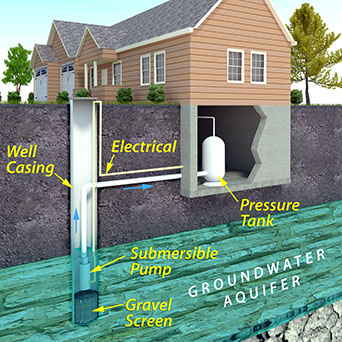The heart of any well system is the well pump. If you live in Harrisburg, PA, or its surrounding areas, understanding the basics of well pumps and their importance is vital. Fortunately, Handyside HVAC, Plumbing & Electrical. is here to provide comprehensive well pump services, ensuring a steady and reliable water supply for your home.
Our team of certified plumbers specializes in all aspects of well pump installation, repair, and maintenance. We have a long history of providing superior service, and we know that it takes specialized knowledge and expertise to properly care for well pumps. That’s why our team has received the most up-to-date training available in order to serve you best. We use only the highest quality parts and equipment, so you can rest assured your pump is receiving the best care possible. Contact us today to get started!

What is a Well Pump?
A well pump is a vital component of your water delivery system, especially if you rely on well water. It’s responsible for drawing water from underground and supplying it to your home. Understanding how a well pump works is crucial for making informed decisions about installation, maintenance, and repair.
Diving Into How a Well Pump Works
A well pump system is a fundamental necessity for homes that rely on groundwater sources. This system comprises several components, including the pump motor, pressure tank, impellers, diffusers, pump casing, pressure switch, check valve, and pump shaft. The pump motor is responsible for powering the impellers, which then create suction to lift water from the well. The impellers are housed within a pump casing, which is specially designed to provide efficient pumping and ensure durability.
The diffusers, in turn, take the water from the impellers and increase its pressure before transferring it up the second pipe. This pipe, which is responsible for transporting the water to your home, is connected to a pressure tank. The pressure tank is designed to accumulate and store water at a specific pressure level, thereby regulating the system’s water pressure throughout the day.
The pressure switch provided within the system monitors the tank’s pressure and automatically turns the pump on or off when necessary, ensuring a continuous supply of water to your home. Meanwhile, the check valve allows for the one-way flow of water, preventing the water from flowing backward and causing damage to the pump system.
Finally, the pump shaft is the connecting rod between the impellers and the motor, which transmits the motor’s energy to the impellers for pumping. Together, all of these components create an effective, efficient, and reliable system that continuously delivers water to your residence.
"Always professional, courteous , and on time for specified time given. Always does a complete job & leaves area clean before departing."
"We have used Handyside services for 10 years. They do not suggest replacing equipment or parts unless they are definitely needed. The company's expertise in every area we've needed is perfect."
We will absolutely be using Handyside again. Their work was excellent and their employees were friendly and took the time to explain things.
Well Pump Installation & Replacement
Selecting the right well pump and ensuring a proper installation is crucial for a reliable water supply. At Handyside Plumbing, HVAC & Electrical, we offer comprehensive well pump installation services to meet your specific requirements. Our experienced technicians will assess your well’s depth, water quality, and water pressure needs to recommend the best pump for your home.
If you have an old well pump that no longer functions as it should, our well pump replacement services can restore your water supply to its working order. We use high-quality pumps and components to ensure longevity and efficiency.
Choosing the Right Well Pump
Submersible Pump
Submersible pumps are designed to be submerged deep within the well. They are highly efficient and ideal for deep wells. These pumps are submerged in water, preventing issues related to freezing and priming. Our well pump installation services include expert setup of submersible pumps, ensuring a consistent supply of clean water.
Shallow Well Pump
Shallow well pumps are typically used for wells with a depth of 25 feet or less. They are cost-effective and easy to install. Our skilled technicians can recommend the right shallow well pump for your water supply needs and provide efficient installation services.
Jet Pump
Jet pumps are versatile and suitable for various well depths. They work by pulling water up using a suction process. Our team can help you choose the appropriate jet pump and install it to ensure your water supply system functions optimally.
Well Pump Repair
Is your well pump showing signs of trouble? Prompt well pump repair is essential to prevent further damage and ensure a consistent supply of clean water. Here are some common signs that indicate you need well pump repair services:
Signs You Need Well Pump Repair
- Low Water Pressure: If you notice a significant drop in water pressure, it could be a sign of a well pump issue.
- Strange Noises: Unusual noises coming from your well pump can indicate a problem that requires attention.
- Intermittent Water Supply: If your water supply is inconsistent, your well pump may be malfunctioning.
- Pump Stops Working: If your well pump has ceased operation, it’s time to call our well pump specialists for immediate repair.
Well Pump Maintenance
Regular maintenance is key to extending the lifespan of your well pump and ensuring it operates efficiently. Our well pump maintenance services include inspecting for wear and tear, cleaning components, and checking for any potential issues. With proactive maintenance, you can enjoy clean water and avoid unexpected breakdowns.
Contact Our Well Pump Specialists!
At Handyside Plumbing, HVAC & Electrical, we are committed to providing top-notch well pump services to homeowners in Harrisburg, PA, and the surrounding areas. Whether you need well pump installation, repair, or maintenance, our certified plumbers are here to serve you. Don’t wait until your well pump system breaks down completely—contact us today to schedule your well pump service and ensure a reliable water supply for your home. Trust the experts at Handyside Plumbing, HVAC & Electrical for all your well pump needs.
